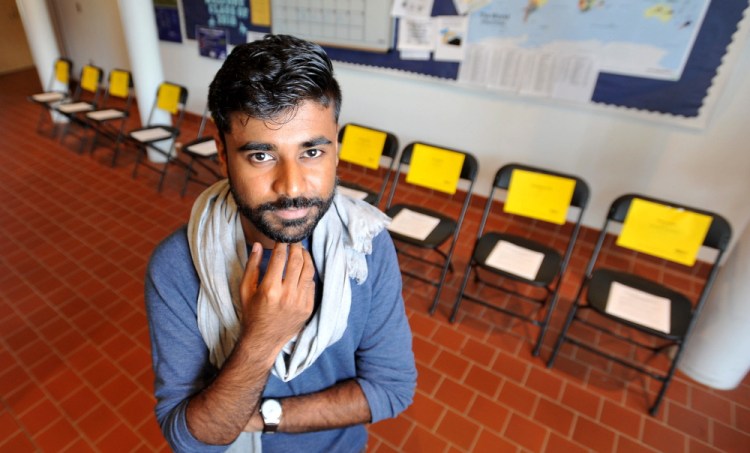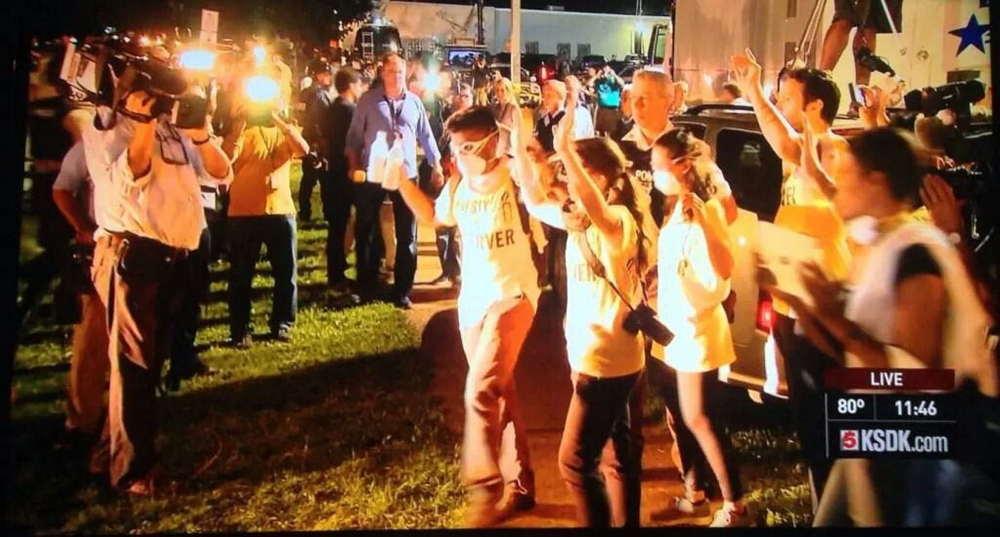WATERVILLE — During a week-long trip this summer to Ferguson, Mo., a 21-year-old Colby College student sought protection in a designated media area of a large protest as tear gas carried by the wind burned his skin.
Earlier that night, Aquib Yacoob and others in a delegation from Amnesty International stuffed wet napkins into their ears to protect themselves from the sound of a sonic weapon police were using to control hundreds of people who had gathered in an area known as “the strip” to protest the shooting of 19-year-old Michael Brown by police officer Darren Wilson.
“It was one of the more intense nights of interactions between protesters and the police,” Yacoob said in an interview. “The National Guard was called in at that point, and it was the first night of the Guard on the ground.”
The observations of Yacoob and others who made the trip will be included in a report that will also include recommendations on how to remedy human rights abuses, according to Jiva Manske, deputy director of membership mobilization for Amnesty International.
Yacoob, a senior at Colby, has also brought the movement back to the Waterville campus.
On Thursday, Dante Barry, the director of the Philadelphia-based group Million Hoodies Movement for Justice, will speak at 7 p.m. at Page Commons on the topic “Beyond Ferguson: Discrimination, Gun Violence and the Legacy of Mike Brown.” The talk is free and open to the public.
The event is part of an effort to address the Michael Brown incident — an unarmed black man shot by a white police officer — and some of the questions it raises, said Yacoob, who met Barry through his work with Amnesty International, where preventing gun violence has been a focus of his fellowship. Barry is one of several activists Yacoob saw arriving in Ferguson in the aftermath of the shooting and represents a group that was founded in the aftermath of the shooting of Trayvon Martin, an unarmed black teenager who was shot and killed in 2012 by a member of a community watch organization in Sanford, Fla.
“Ferguson is a key point in a movement that is building in the United States,” said Yacoob. “There is momentum around police violence, around gun violence, around discrimination and policy. How do we move beyond Ferguson? What is the next step? Not that we’re just left paralyzed by this crisis that happened because it’s not just a one time event.”
While in Ferguson, Yacoob paired off with another member of the 12-person delegation to observe the protests, which Amnesty International had been invited to do by community members there. Amnesty International promotes human rights and is active in global campaigns against injustice.
At about 9 p.m. Yacoob arrived on the strip in Ferguson, and as the night wore on, police began asking protesters to leave, he said. That’s when police launched the tear gas.
“All the protests I saw throughout this entire process were fairly peaceful. They were peaceful assemblies of individuals,” said Yacoob. “When the tear gassing happened it was later on in the night. I forget the exact time, but the police had asked folks to leave the space and people from the community were staying.”
Sirens went off and there were announcements that tear gas would be used, said Yacoob. Some delegates from Amnesty International helped media personnel who were caught in the tear gas and lying on the ground, he said, adding that when he heard the announcements he and a colleague began moving to the rear of the group of protesters and toward a designated media area.
But it wasn’t enough to escape the wind that picked up some of the gas and sprayed it on their skin.
“Tear gas is not a joke. It doesn’t make you cry as commonly perceived,” he said. “It burns you and it pains you for a really long time.
“So while we were far away, we had burnings on our skin. I woke up the next morning with my face burning, and this is after going back to my hotel and taking a shower. That was the effect on us, and there were folks who were caught in the tear gas full force.”
EXPERIENCED ACTIVIST
Yacoob became involved with Amnesty International while a high school student in Queens, N.Y., and received the Ladis Kristof Memorial Fellowship for Organizing and Activism from the group in January 2014. The fellowship allowed him to travel with the group to United Nations hearings in Switzerland this summer and to Ferguson to assist with training in nonviolent action and de-escalation.
He was also there to collect observations for a report Amnesty International is preparing calling for an investigation into allegations of human rights abuses in Ferguson.
On Aug. 9, Brown was killed after Wilson shot him six times in the St. Louis suburb of Ferguson. The circumstances surrounding the shooting are in dispute and have sparked debate across the country, including on several college campuses, over gun violence, discrimination and police actions.
“Aquib has been a very engaged youth leader within our movement over the last several years,” said Manske. “He has been involved in a number of different projects related to engaging and mobilizing youth activists around the country on the most pressing human rights issues in the world. When Mike Brown was shot, and later when the protests started, it made sense to start a delegation and to have Aquib be a part of it as a representative of the broader youth movement.”
The last Amnesty member in the delegation left Ferguson on Aug. 25 after about two weeks assisting with training in nonviolent protest and continuing the call for investigations into any human rights abuses that may have happened during the shooting and the protests that followed.
The issue is also personal for Yacoob, born in the South American country of Guyana.
In a Maine Compass column published by the Morning Sentinel and Kennebec Journal , he writes, “This will be my third year living in Waterville. It scares me that so many people don’t think race matters when it comes to violence, that so many think we live in a color-blind society.
“I am a man of color. Race matters.”
PUBLIC EXHIBITION
Yacoob and other students at Colby’s Amnesty International chapter have developed a public exhibit inspired by the events in Ferguson that is dedicated to raising awareness of gun violence.
Last week, that included a display of more than 150 chairs, representing the number of children under the age of 12 reported to have been killed by gun violence, including the 20 students who were shot and killed at Sandy Hook Elementary School in Newtown, Conn., in December 2012.
“I know there were several students, faculty members and staff who were outside looking at the exhibit,” said Tashia Bradley, associate dean of students and faculty adviser for Amnesty International at Colby. “So I think it helped to bring awareness because people were looking and trying to figure out, ‘What is this?’, ‘What does it mean?'”
Inside Cotter Union, Colby’s student center, another 10 chairs have been placed in memory of young men of color who have been killed while unarmed.
“Because of the things that have been going on in Ferguson, a lot of people want to start conversations about things that are difficult to talk about and a lot of students want to specifically talk about Ferguson,” said Thalia Giraldo, a Latina student also involved in the campus chapter of Amnesty International. “It’s really important to make it an inter-racial discussion because what happens is that a lot of the issues of race and a lot of the events that happen about race, the only people that come are the people who are in the minority.”
During the week that Yacoob spent in Ferguson, he said he was inspired by young people, including many of color, trying to bring about change in their community.
“It’s really difficult. Of course it affected me emotionally. I think it affected anyone that was there emotionally,” said Yacoob. “One thing about being part of a delegation on site was at the end of the night, I got to leave Ferguson and go back to my safe zone. I left. There was that privilege in my position there. Now we’re trying to work to elevate the voice and the work that is happening in Ferguson at our designated posts across the U.S. and around the world.”
Rachel Ohm — 612-2368
Copy the Story LinkSend questions/comments to the editors.





Success. Please wait for the page to reload. If the page does not reload within 5 seconds, please refresh the page.
Enter your email and password to access comments.
Hi, to comment on stories you must . This profile is in addition to your subscription and website login.
Already have a commenting profile? .
Invalid username/password.
Please check your email to confirm and complete your registration.
Only subscribers are eligible to post comments. Please subscribe or login first for digital access. Here’s why.
Use the form below to reset your password. When you've submitted your account email, we will send an email with a reset code.